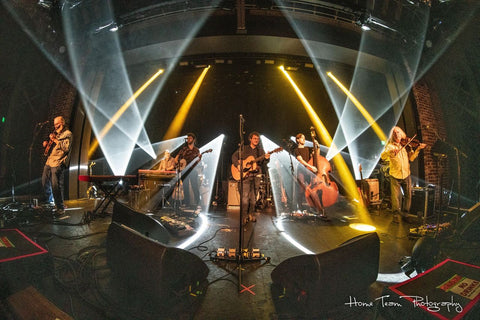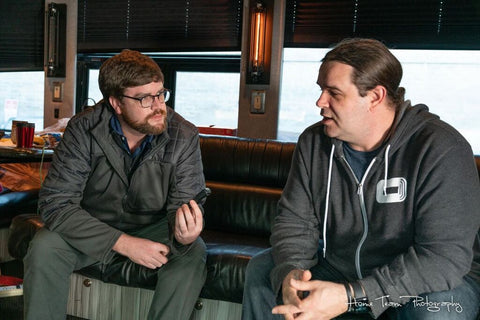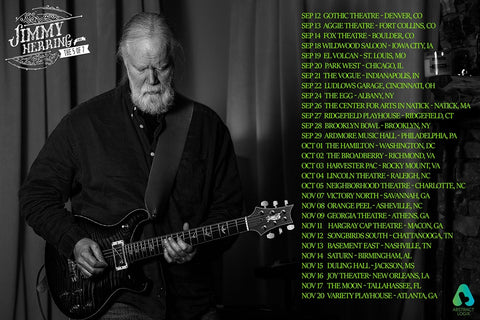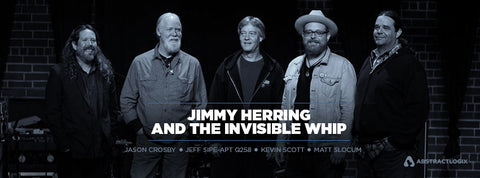News
Matt Slocum & Mike Robinson Discuss Life with Railroad Earth March 3, 2020 08:53


-



All Things Equal 5 of 7: An Interview with Jimmy Herring & Kevin Scott September 18, 2019 12:11

Interview by Jordan Kirkland: Live & Listen
Photo by Craig Baird: Home Team Photography
Interviews and artist spotlights have always been the "bread and butter" of Live & Listen. Over the years, I've had the opportunity to talk with so many amazing artists, in an effort to learn more about their current endeavors and share these stories with as many people as possible. Earlier this week, I was asked if I had interest in chatting with famed guitarist Jimmy Herring, who just kicked off a major tour with his latest project, The 5 of 7. That was obviously an easy decision.
Many know Jimmy's work as lead guitarist for Widespread Panic, Aquarium Rescue Unit, and Jazz is Dead. This conversation focuses on The 5 of 7, which features the likes of Kevin Scott (bass), Matt Slocum (keys), Rick Lollar (guitar/vocals), and Darren Stanley (drums). The group shares one common thread: they're all students of the late Col. Bruce Hampton. As you'll read below, this commonality continues to shape and influence their approach to music and life in general.
The 5 of 7 continue their tour tonight in Iowa City and will continue trekking across the United States through early October. After a month long break, which allows Jimmy to reunite with his Widespread Panic band mates for weekends in Milwaukee & New Orleans, the 5 of 7 will continue through the Southeast, before closing things out with a multi-night run in Tokyo, Japan. See below for our full conversation with Jimmy and Kevin Scott!

Let’s get right to it. Your latest project, The 5 of 7, kicked off the tour in Colorado over the weekend. What did you take away from this band’s first official performances?
Jimmy: Yeah man. The whole idea was, in my mind...I wanted to work with some younger musicians. I'd already been working with Kevin (Scott) from the last band. Matt Slocum too, of course. They had another band, King Baby, that just blew me away. I loved Rick (Lollar) and really wanted to work with a singer. I couldn't imagine anyone else. As soon as I heard him, I thought, "This guy is great. Let's work with him." Darren Stanley (drums) had been working with Bruce (Hampton), and I'd heard him a few times. I was just knocked out by him. Kevin told me that they had a real chemistry together. So, that seemed like a no brainer. We just got together, with no gigs on the books, just to see how it felt. Nobody wanted any money. No one needed a hotel room or a flight. We just got together for fun, and we knew the first day, you know? I was like, "This is gonna be blast."
What did I take away from the first gig? Nothing's ever perfect. We know that. Every gig has gotten better so far though. The first night was Denver, then Fort Collins was better, and then Boulder was even better. So...I'm really looking forward to Iowa City tomorrow night. We're having a lot of fun out here.
Now you've had two days to hopefully rest and regroup. What does an off day look like for you on this tour?
Jimmy: You'd be laughing. Sleep 'til 2:00 PM. (laughs) The other guys don't do this. I'm older now. Sleep 'til 2:00 PM. Wake up. Stumble into the lobby. Drink coffee. Laugh at everybody. Go back to the room and make a phone call. Come back. Laugh again. Get another cup of coffee. Tell some Bruce stories. Laugh some more. Then, maybe talk about...I don't know man. That's all we've done so far. (laughs).
Has there been a particularly good Bruce story that you guys have relived this week?
Jimmy: There's probably been several. The one just we told five minutes before we called you was how he said he didn't want us to be skinny. He wanted us to get fat. He said we sounded better when we were fat.
Kevin: Always.
I suppose there may be some truth to that.
Kevin: B.B. King. Albert King.
Jimmy: That's right. The fatter the better.
Kevin: Bernard Purdie. Fat.
Jimmy: The fatter you get, the better tone. (laughs)
Incredible. I'm sure it's been amazing to see this band come to life. We've covered some of this already, but what else can you tell me about how this lineup fell into place?
Jimmy: One thing I didn't say is that Kevin is the conduit between the worlds. He has had his finger on the pulse of what's happening in the Atlanta music scene for years. He's who I went to and said, "Let's try something different. I want to work with a singer. Who else is in Atlanta?" Man, I've lived in Atlanta since 1986. I got in Bruce's band three years later. And since then, I haven't been to Atlanta. (laughs)
You know what I mean? We're touring all the time. I really didn't know what was happening in Atlanta. These younger people started coming into my life, like Kevin and Duane (Trucks), and they'd tell me, "You've gotta hear this guy." I started meeting guys like Kebbi (Williams) who plays in Derek Trucks' band (Tedeschi Trucks Band). All the things he has done on the side. Kevin had that jam going on in Atlanta. I may not have been there for every one. I went to a few. I really enjoyed it a lot. I like to play with people with enthusiasm. He knows them all, and he's got that enthusiasm. He's kind of the architect of the band.
That's a great architect to have. You've had the opportunity to be a part of countless projects. How does the dynamic of this particular group continue to push you as both a guitarist and a person?
Jimmy: We have a great variety of music. It never gets boring, because it delves into all of the music we play and the spontaneity that might happen. The thing I love about playing with these guys, well, there's a lot. One of them is that they won't take you to that place at an inappropriate time. You know? Inappropriate is subjective. We could be playing a ballad, and there might be a few things that happen in the music that take us toward a Zambi direction. I don't have to worry that it won’t come back. These guys are young, but they're mature. They follow and listen to each other.
If you hear a guy play something a little left of center, the other guys will react, but if the person with the ball doesn't continue in that direction, then it's just a little funny moment, and then it goes back. There's always the threat that it might completely ascend into a spontaneous moment that might last longer than a moment. You know what I mean? I've played with a lot of other people when it might go to that place and never come back. And that's cool too, but this is not that.
We're trying to play songs without putting ourselves in prison of being stuck by the song. A song shouldn't be pre-thought out, and it shouldn't just do one thing in one certain spot. I think we're walking that line pretty well, don't you Kevin?
Kevin: Oh yeah. For sure.
Jimmy: That's the hope. That keeps me going, man. The youth and exuberance of these guys… Everybody wants to be here, and everybody gets to play. Nobody feels like they're just the background band and I'm gonna take every solo. We don't want to do that. We want everyone to get to get a chance play and interact with one another. Part of that is being able to write music that makes that possible. Hopefully, we'll write more music together. We've got some, but we want more.
We're playing some of my tunes from the past. Some of King Baby's tunes. We're doing a few covers. It's still interesting, and there's everything from ballads to funk and blues. Leanings towards jazz, but I wouldn't call it jazz, per say. We have R&B music in there. All of the things we love are a part of what we're doing. We try to pace the set where it's not too many of the same things in a row. We have a lot of tunes with extended improvisation for each band member. We're trying not to put those all in a row. That way it's not the same thing for 35-40 minutes. You know what I mean.
Absolutely. I'm sure you're well aware that you have one of the more attentive audiences around, and you've got to keep them guessing.
Jimmy: Man, it's amazing how wonderful they are. They are perfectly willing to go anywhere you want to go. It's really wonderful.
Have you noticed that this is a pretty common thread with your fans with both ARU and Panic as well?
Jimmy: Yeah, I would say that. Absolutely. Panic fans are just up for anything. They don't get bored if you go on an extended improvisation. They're loving it. And when they come to these these shows and support what we're doing, I'm so grateful. It goes all the way back to the ARU days. We started playing with Panic back in those days. We were opening them with Bruce's band, and it gave us a whole new audience. Through playing with Panic, we met the guys from Phish and Blues Traveler, and we toured with them, opening for them back in the day. It's really still with us today.
It's funny. The world seems to want to put you in a category or genre, and we don't really think about music that way. We just like music. We don't really draw a line in the sand and say, "This is jazz. This is blues. This is improvisation. This is bluegrass." We don't really think in those terms. Everyone is really stylistically diverse, and it just seems like the audience loves all of it. It's just a gift to give, to be able to blow down the walls between genres with no apologies. We're lucky.
I can only imagine how rewarding that is on your end. So, how about you, Kevin? What type of impact has building this relationship and playing with Jimmy had on you?
Jimmy: Don't make me cry, Kevin. Don't make me cry!
Kevin: I've always had a weird way of putting something in my head and saying, "I'm gonna do this." When I was younger, obviously Bruce's influence on me as a person and musician was huge. But one of the first times I heard Jimmy play guitar, I was 16 years old, and I was like, "I'm gonna work with that guy one day. It's gonna happen." The difference between what Jimmy does versus any other guitar player on the planet, and I've worked with a lot of them in the jazz/fusion realm, the way he plays is who he is. Sure, when it comes down to musicianship or guitar playing, he's number one, but as a person, he's number one. That's why people are drawn to him. That's why we go play clubs, and there are 800 people in Colorado. He appeals to people because of who he is. That's something you really can't teach somebody.
The impact of as a musician, for me, a guy like him giving everyone in the band equal opportunity. That just does not happen. A lot of other bands that I've worked with, I've essentially had to answer to someone in a certain way in terms of my playing or personality. Jimmy has given everyone the opportunity to be in a band where are no side men. That's the big difference. He gives everyone complete freedom to be themselves, just like Bruce did. That's the biggest impact I've experienced. That's the way I try to lead a band too.
Working with Jimmy has definitely had the biggest impact on me as a person and my career. He's kind of set a bar that's impossible for people to get to. In this band in particular, it's the first time I've ever been in a situation on the road where on the stage, I'm completely confident. I don't have any kind of blockage to being myself. In every other project I'm in, there is essentially a certain hat that I'll have to put on, and that's good. I love all of the projects I'm a part of, and I think the music is great. In this particular band though, I'm 100% myself. I see other people who have to be someone else when they go to work for someone. I'm saddened by that.
Jimmy: I mean, why would you hire a guy who beautifully plays his or herself, but yet you're gonna say, "No. Put that in a little box over here. We'll use that only doing certain parts of the show, or not at all." I don't understand that. We're all in this thing together. You can't do it any other way, in my opinion. We're all on the stage. Everyone's voice is combined together, and that's what makes the big picture. Why would you want to stifle that in any way?
I'm blessed, because I'm lucky enough to have a great life in music. This thing we're doing here, this is just cake. It really is. It's so easy to go out and do this. It might be a rough tour schedule, but when we get on stage and get to playing, that's the easy part. It's all that easy stuff that makes it hard. The food wasn't good, or you didn't get a good night of sleep. Whatever. With those kinds of things entering the picture, why would anyone want to complicate it more by telling someone that they can't be themselves?

You mentioned that there are at least a handful of new originals in the mix. I was curious to know how the songwriting process is playing out with this band in particular.
Jimmy: You want to take this one, Kevin?
Kevin: Sure. Someone brings a sketch to the table, and then we all comment on it. That's what is so beautiful about it as a band. Obviously, there are songs with pre-written parts that have been around for a while. In terms of a new song, Jimmy might say, "Alright. I've got this progression. What can we do with it?" Rick might suggest lyrics over it. It's just open communication, which is the basis of success of anything.
Jimmy: Absolutely, and we had the luxury of getting together without gigs on the book. The first time we got together was last November, so it's been almost a year, but with no pressure. That's what I wanted more than anything, to work with some young, enthusiastic musicians who were like, "Let's see what we can do with this. Let's see where it goes." There was no pay for the rehearsals. There were no hotel rooms.
Kevin: I've gotta tell him the story of the load-out.
Jimmy: Oh yeah.
Kevin: We basically had to load out all of the gear for the tour from a box truck with no lift. We had the (Hammond B3) and a case that weigh 400 pounds. We did all of this as a band. There wasn't a single person that left. We all could've said, "I don't want to do this. This isn't my job." Everyone was in there, in the trenches, lifting this heavy ass shit and getting it done. Everyone took responsibility and said, "Let's knock this out as fast and safe as we can." It was actually a good moment to begin the tour.
Jimmy: These guys wouldn't let me help with the B3. I wanted to, but they wouldn't let me do it. We've got all these strong young people. I'll say this though. I can't imagine doing a gig without a B3 organ. It's heavy. It's a game changer. It changes your travel plan. If it weren't for the B3, we could rent a cargo van, stuff the gear in there, and we would be just fine. We could save tons of money. But you know what? Without the B3, where is the Earth? We need the B3. The B3 is critical to what we're doing. And Matt Slocum is a master of it.
Kevin: An absolute master.
Jimmy: The idea of touring without a B3 is just not an option. So yeah, I'd get down there and lift that damn B3, because I don't want to go to the next town without it. Even guys who aren't playing the B3 know how important it is.
You really can't replicate the sound of the B3. So Jimmy, this tour puts you back on the road a bit more; hopping from one city to the next. It can be a grueling lifestyle, but I know there's some excitement about getting back out there as well. What do you enjoy most about touring and playing the more intimate venues?
Jimmy: I would say that the camaraderie is probably number one. You're in the trenches together. And let's face it, a lot of people have it a lot worse. We've all had it a lot worse. There are people calling me that I've known for 30 years going, "What are you doing to yourself? You're 57 years old!" There's just a rhythm you get into with a band playing a schedule like this. You don't have a twelve man crew. You have a three or four man crew. The musicians help each other. Setting each other’s rigs up, you know?
It's hard to tear down your own rig, because people are still in the room screaming at you. "Kevin! Kevin!"
Kevin: They aren't screaming my name.
Jimmy: Oh yeah they are. They're screaming everybody's name. If they see you on stage after the show, they'll be screaming at you. But setting up your rig when no one’s around, that's easy to do. We all take part in that. It makes things easier for the four crew members we have, which are wearing five hats a piece. One guy is the tour manager, merch guy, spiritual leader, and God knows what else. You've got a guy who is guitar tech, bass tech, and keyboard tech. Then you've got another guy driving the bus. He’s out there lifting gear, and he shouldn't be. That's not his job, but everybody wants to help. I like that, and that's one of the things I take away from a tour like this.
That's not to say that I don't love when there's a twelve man crew. You show up, and everything is already done when you walk in the door. That's great. This is a different thing. I feel like with the smaller venues, well, "small" is relative. If we can't fit on the stage, I don't like that. If we're playing a venue that is too small for our footprint on stage, I'm not happy about that. When I say small, I mean any place that has a big enough stage for this five-piece band's equipment, and we do have a lot of equipment. The reason is because in this day and age, you've got Kemper and ax effects for guitar players where they plug into a computer, and it goes to the house. There are no speakers on stage. Bass player is playing through computers. Keyboard player is playing through jack-of-all-trades keyboards, or a computer.
This whole mass castration of rock and roll; where you can't play louder than we're talking right now without offending someone. I don't know what to say to those people. I think I would say, "If our band is too loud for you, I'm sorry. Don't come here." We're playing with 40 watt guitar amps. Kevin's got a SVP bass amp. It's only the sound of a generation, you know? This is the music that made us want to play. So why would we be worrying about offending someone? That's what we love. As long as we can fit on the stage, we're gonna set up close together, where we can feel each other’s sweat and communicate better with each other.
I guess I cut my teeth with Bruce in these little rooms. There is a thing that you get there that you just don't get in the bigger venues. You can call it more intimate. That's one thing. It is more intimate. The people are literally like five feet in front of you. I love that, and I don't want to hurt anyone with volume. You know, it is weird sometimes to look at the front row and realize someone's face is right in your speaker cabinet. I'll tell people to put their ear plugs in. We'll cover up the speakers with something to help keep from hurting anyone. We certainly don't want to hurt anyone, but I don't want to play through a 12-watt amp. You know what I mean?
I don't think your audience would want that either.
Jimmy: They probably wouldn't, man. But you've got to have a room that can contain these five people. If you're in a room that's too small that can't contain the sound of these five people, that's probably not good. I mean, I know that we'll be in some rooms like that. Those first three gigs we did, none of those rooms were that small. They aren't too small for our sound. We had The Gothic in Denver, The Aggie in Ft. Collins, and The Fox in Boulder. What does The Fox hold, like 700 people?
Kevin: Probably.
Jimmy: But it has a real stage, and we can fit on it. That room is big enough to contain our sound. We're in heaven. 700 people. That's perfect. That's what I take away from all of this. It's just fun, and it gets you back to what made you want to play in the first place.
Love hearing that. Just one more thing before we wrap this up. I know it's early, and you guys all have busy schedules, but what do you see for the 5 of 7 beyond this fall? Is this a project we could see continue and evolve?
Jimmy: The idea of it was that we would play this tour and see how we all felt about it. Having played three shows, I can say that if keeps going like this, yes it's happen again. As long as everyone in the band wants it to, and they feel like doing more. From what I've experienced thus far, I want to play more. But I'm older now. This is part of the problem. I'm older, and I love to play, man. Sometimes touring can be tough. It's not really the touring though. It's that commitment you have to make a year in advance, where you see your whole life laid out on a calendar.
It's like someone picking your clothes out for you and saying, "Here's what you're wearing on Tuesday, Wednesday..." Sometimes it's hard to make that commitment. Now that people don't buy albums like they used to, touring is a crowded place to be. I mean, we've always toured. That's our thing. We've always made records, but it's not like the records have sold enough to stay at home. We weren't Steely Dan, you know what I'm saying?
The point being, I'm just older now. You’re at the end of a tour, and people are already looking to book dates 12 months out. I'm like, "What? Wait a minute. I just want to go fishing. I don't want to think about this right now." Sometimes I just want to hide for a little bit after a tour. If I have some time, I want to see my family, go out in the woods, and do some things I didn't get to do when I was younger.
I'll probably be holding it back from being all it can be. If we were to tour 180 shows a year...oh my God, it might be able to get bigger if we toured that much. That's what it would take to make it really take off. You've got to be on the road all the time. I don't want to do that. I hope the other guys can be patient with me.
Having said all of that, after this tour, if I feel like I feel right now, I'll be willing to talk about the next batch of dates within two months after we finish. I mean, I still play with Panic, and we don't tour anymore, but we will play a lot of shows. That's the number one priority. I can't do anything that gets in the way of that. Sometimes I have to wait and see what the Panic plans are before I can do anything else, and that's fine. I love those guys, and I love being in that band. I'm sure we will play more though. So far, everybody loves each other, and we're having fun.
Watch Jimmy Herring & The 5 of 7 performing in Denver here:
Video by Coloartist
Jimmy Herring Announces Formation Of New Group 'The Invisible Whip' January 27, 2017 09:24

While we won't be seeing quite as many shows from Widespread Panic in 2017, lead guitarist Jimmy Herring shows no signs of slowing down. Earlier this morning, Herring announced the formation of a new all-star group, "The Invisible Whip." This group will feature a cast of long time friends, including Jeff Sipe (Aquarium Rescue Unit) on drums, Jason Crosby on Wurlitzer and Rhodes, Matt Slocum (Aquarium Rescue Unit) on B3 organ and clavinet, and Kevin Scott on bass. While no official dates have been announced yet, Herring's announcement mentions, "Coming soon to a town near you in 2017 and beyond." Stay tuned for further details on this exciting development!
Click Here: Follow Jimmy Herring on Facebook

